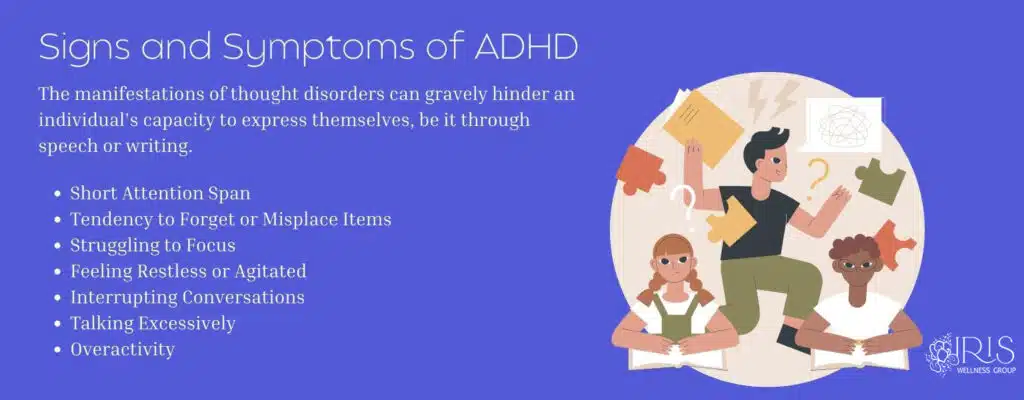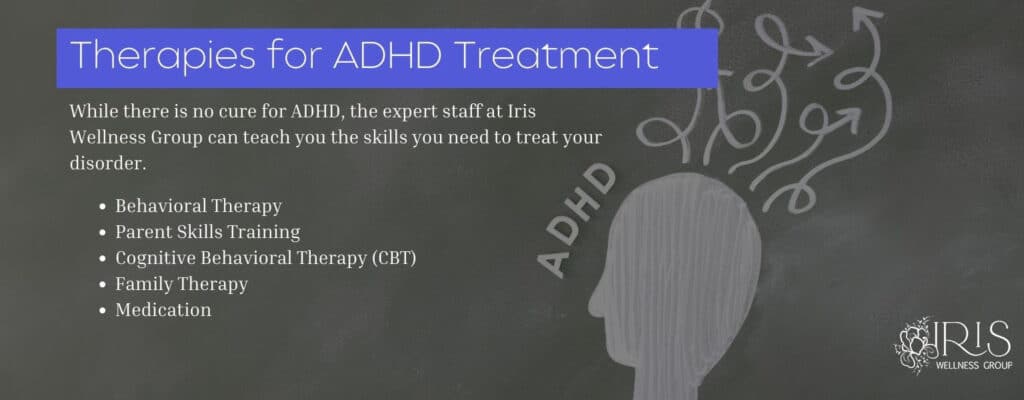Table of Contents
What is ADHD?
ADHD, a mental health condition, often manifests as hyperactivity, impulsivity, and difficulties in maintaining focus. Not just a childhood disorder, the National Institute of Mental Health (NIMH) reveals that approximately 4.4% of U.S adults aged 18 to 44 also grapple with ADHD. This condition can hinder one’s academic, professional pursuits, relationships, and even self-esteem. Some adults, in an attempt to cope, resort to substance abuse.
At Iris Wellness Group, we understand the dual challenges of ADHD and addiction.
Common ADHD behaviors include:
- Impulsivity (interrupting others, low patience)
- Inattention (forgetfulness, avoiding demanding tasks, difficulty sustaining focus)
- Hyperactivity (restlessness, constant talking, incessant movement).
These behavioral patterns can negatively impact personal and professional spheres, often leading to feelings of shame, guilt, and diminished self-worth.
If you or a loved one experiences these symptoms, Iris Wellness Group is poised to help. We offer tools and techniques to manage ADHD symptoms healthily, combat addiction, and restore self-confidence call us today 423-564-6114.
Types of ADHD
ADHD presents in three distinct forms:
- Inattentive Dominant: Individuals with this variant often struggle with tasks, instructions, and maintaining focus.
- Hyperactive-Impulsive Dominant: This form primarily showcases behaviors such as restlessness, interruptions, and impatience.
- Combined Inattentive and Hyperactive-Impulsive: Exhibiting both inattentive and hyperactive tendencies, this is the most prevalent ADHD type, characterized by focus challenges, impulsivity, and heightened energy.
ADHD and Addiction
ADHD can profoundly affect academic, work performance, and social development. It’s not uncommon for those with ADHD to resort to substance abuse as a coping mechanism, given the brain’s altered dopamine levels. Studies indicate that roughly 21% of males and 13% of females with ADHD engage in drug or alcohol abuse. This inclination can stem from an inherent dopamine deficit in ADHD individuals compared to those without the disorder.
Medications like Ritalin and Adderall, commonly prescribed for ADHD, can effectively manage symptoms but also carry a risk of addiction. Therefore, when treating ADHD alongside substance abuse, there’s a delicate balance to maintain, ensuring that both conditions are addressed without exacerbating either.
ADHD symptoms such as inattention, impulsivity, and restlessness can be closely intertwined with addiction. Whether it’s self-medicating to manage ADHD symptoms or becoming dependent on prescribed stimulants, the resulting addiction cycle necessitates professional intervention. Effective treatment requires a multidimensional strategy that tackles both ADHD and addiction. Dual diagnosis programs, specializing in simultaneous treatment of ADHD and substance use disorders (SUD), leverage various therapeutic techniques to foster healing and cultivate sustainable, healthy habits.
How do ADHD and Addiction Develop?
Several factors can influence the likelihood of an individual developing ADHD or succumbing to addiction. These include:
Genetic Factors
A strong hereditary component exists in ADHD. Children diagnosed with ADHD are four times more likely to have a relative with the same condition. Genetics also significantly influence susceptibility to addiction.
Toxic Substance Exposure
Studies have highlighted a link between maternal consumption of alcohol or tobacco during pregnancy and the onset of ADHD in offspring. Furthermore, lead exposure has associations with hyperactivity. When a fetus is exposed to illicit drugs, it might predispose the infant to substance dependence later in life.
Neurological Trauma
Brain injuries, diseases, tumors, or strokes might lead to challenges with attention and impulse regulation. Although such instances are rare causes of ADHD, diminished impulse control can pave the way for addictive behaviors.

Symptoms of Attention Deficit Hyperactivity Disorder (ADHD)
ADHD symptoms can be grouped into two behavioral categories:
- Inattentiveness (challenges with concentration and focus)
- Hyperactivity and impulsiveness
While many with ADHD exhibit traits from both categories, some may only experience one. For instance, nearly 20-30% of individuals with ADHD primarily struggle with attention and focus but don’t show hyperactivity or impulsiveness. This subtype is often referred to as attention deficit disorder (ADD), which can be less noticeable and hence, often overlooked.
ADHD diagnoses are more common in boys, while girls tend to predominantly show inattentive symptoms. The lack of disruptive behaviors in girls may cause their ADHD to be overlooked or undiagnosed.
ADHD Symptoms in Children and Teenagers
ADHD symptoms in children and teens are typically evident before age 6 and manifest in multiple settings, like both home and school.
Children might display signs of both inattentiveness and hyperactivity-impulsiveness, or just one of the behaviors.
Inattentiveness characteristics include:
- Short attention span and easy distractibility.
- Making careless errors, like in school assignments.
- Tendency to forget or misplace items.
- Struggling with lengthy or mundane tasks.
- Difficulty listening or following instructions.
- Frequent task or activity switches.
- Challenges in organizing tasks.
Hyperactivity and Impulsiveness traits are:
- Restlessness, especially in quiet situations.
- Constant fidgeting.
- Struggle to focus on tasks.
- Overactivity.
- Talking excessively.
- Impatience or inability to wait.
- Acting on impulse without contemplation.
- Interrupting others during discussions.
- A diminished sense of danger.
Such symptoms can hinder a child’s progress academically, impact their social interactions, and lead to disciplinary issues.
ADHD Symptoms in Adults
Identifying ADHD symptoms in adults is challenging, partly because there’s less research on adult ADHD.
While ADHD is a developmental disorder believed to manifest in childhood, many children’s symptoms persist into adulthood, though they may manifest differently. For instance, adults might experience decreased hyperactivity but consistent inattentiveness, especially with the complexities of adult responsibilities.
The symptoms in adults are often subtler than in children. Here’s a possible list of ADHD symptoms in adults:
- Inattention and a tendency for oversight.
- Habitually starting new tasks without completing prior ones.
- Challenges in organization.
- Struggling to focus or set priorities.
- Consistently misplacing items.
- Forgetfulness.
- Feeling restless or agitated.
- Struggling to maintain silence; often speaking impulsively.
- Interrupting conversations or responding hastily.
- Experiencing mood fluctuations, quick irritability, and short temper.
- Struggling to manage stress.
- Displaying extreme impatience.
- Taking unnecessary risks, sometimes disregarding personal or others’ safety, like reckless driving.
ADHD Testing and Assessment in Chattanooga
When it comes to testing for ADHD, a range of assessments is available to accurately evaluate the presence and impact of symptoms. In Chattanooga, our dedicated professionals utilize various tests to ensure a comprehensive understanding of each individual’s unique situation.
- Behavior Assessment System for Children (BASC): This assessment delves into symptoms associated with hyperactivity, aggression, attention problems, anxiety, depression, learning difficulties, and conduct issues.
- Conners Rating Scale: Evaluates symptoms’ effects on home life, academics, relationships, and more. It’s also available as the Conners Adult ADHD Rating Scales for assessing ADHD in adults.
- Child Behavior Checklist/Teacher Report Form (CBCL): These tools assess behavioral and social concerns, including withdrawal, physical complaints, and aggression.
- Tests of Variable Attention (TOVA): TOVA evaluates attention abilities when faced with non-preferred tasks, often used alongside other assessments.
- Adult ADHD Self-Report Scale (ASRS): Designed for adults, this self-report test helps identify ADHD symptoms in individuals.
In addition to self-report and interview-based assessments, Chattanooga’s health professionals may employ the Neuropsychiatric EEG-Based Assessment Aid (NEBA) System. By analyzing brain wave patterns, this test can provide valuable insights, particularly in children aged six to 17, enhancing the accuracy of ADHD evaluations. After the completion of testing and the confirmation of an ADHD diagnosis, individuals can initiate their ADHD treatment journey.
Start Your ADHD Treatment Today!
What are the Best ADHD Treatment Options?
About ADHD Medications
Choosing to use medication for ADHD requires careful consideration between you and your doctor. The decision should factor in the timing of medication, whether it’s only during work/school hours or extends to evenings and weekends.
Types of ADHD Medications:
Stimulants (CNS Stimulants)
- Function: Increase brain chemicals like dopamine and norepinephrine. They often have a calming effect on ADHD individuals, enhancing focus.
- Common Types:
- Amphetamine-based (e.g., Adderall, Dexedrine)
- Dextromethamphetamine (e.g., Desoxyn)
- Dexmethylphenidate (e.g., Focalin)
- Methylphenidate (e.g., Concerta, Ritalin)
Nonstimulants
- Used when stimulants aren’t effective or cause severe side effects.
- Types:
- Atomoxetine (e.g., Strattera)
- Antidepressants like nortriptyline (Pamelor)
- Others like guanfacine (Intuniv) and clonidine (Kapvay). Their exact ADHD mechanism is still being studied.
Potential Side Effects:
- Common for Both: Headaches, sleep issues, stomach upset, nervousness, irritability, weight loss, dry mouth.
- Stimulant-Specific: Hallucinations, high blood pressure, allergic reactions, suicidal tendencies.
- Nonstimulant-Specific: Seizures, suicidal tendencies.
It’s essential to work closely with your doctor to determine the right medication and dosage, keeping in mind possible side effects.

Therapy Options for ADHD Treatment in Chattanooga, TN
While there is no cure for ADHD, the expert staff at Iris Wellness Group can teach you the skills you need to treat your disorder. Treatment for ADHD can include taking medications to increase your attention, reduce hyperactivity, and control impulsivity.
However, medications are just a part of a comprehensive treatment plan. Since ADHD can negatively impact a person’s self-esteem or ability to pursue fulfilling relationships, therapeutic interventions can help a person rebuild their life. People with dual-diagnosis of ADHD and addiction can benefit from:
- Behavioral Therapy:
- Aimed primarily at school-aged children, this therapy helps in altering behaviors that obstruct their day-to-day functioning. Therapists often monitor behaviors in school and at home, enhancing social skills and introducing routines. Using behavioral analysis, positive behaviors are encouraged via rewards and appreciation. Classroom interventions, supported by educators and specialists, can further reinforce these positive behaviors with reward mechanisms.
- Parent Skills Training:
- Targeted at parents of ADHD-diagnosed children, this approach educates them on the significance of using positive reinforcement for encouraging preferred behaviors. Parents are guided to give immediate feedback, be it in the form of praise for a positive action or overlooking unwanted ones.
- Cognitive Behavioral Therapy (CBT):
- This method imparts valuable strategies to individuals with ADHD, teaching them impulse control and reflective thinking before acting.
- Family Therapy:
- Especially beneficial for families dealing with an ADHD diagnosis, this therapy fortifies communication dynamics, helping them better understand and adapt to the associated challenges. As someone who practices family therapy, I can’t emphasize enough its importance in building stronger familial ties, regardless of the specific diagnosis.
- Medication:
- Stimulant and certain non-stimulant medications have been recognized as effective for ADHD symptom management, enhancing focus and curbing impulsivity. However, it’s paramount to consult a healthcare professional before starting any medication.
ADHD may leave deficits in critical life domains that impact a person’s overall quality of life. Iris Wellness Group believes that addressing the person’s “whole-self” in recovery will yield the best results for success. Taking holistic approaches, like learning life skills and exercising, can help alleviate symptoms of ADHD. Call us today to start your ADHD Treatment 423-564-6114
.
Getting Treatment for ADHD in Chattanooga, Tennessee
If you or someone close to you displays ADHD symptoms, it’s crucial to reach out to a knowledgeable mental health specialist to discuss future actions. Working together, you can determine the most appropriate treatment plan tailored to individual needs.
Iris Wellness Group, a mental health treatment center in Chattanooga, Tennessee, is a comprehensive mental health facility catering to an array of diagnoses such as Eating Disorders, Anxiety Disorders, Mood Disorders, PTSD/Trauma, several Personality Disorders, and more. We combine the best elements from outpatient, residential, partial hospitalization, and community psychology programs. This holistic approach ensures not just a personalized experience for our clients but also aims to prevent repetitive hospital admissions, excessive institutionalization, and promotes integration into family and the broader community.
To learn more, call us today at 423-564-6114.
ADHD Specialist in Chattanooga, TN
Our ADHD specialist Chattanooga, TN is committed to providing top-notch care for individuals facing the challenges of ADHD. With recent statistics indicating that approximately 10% of children and 4% of adults in Chattanooga are affected by ADHD, our specialized expertise becomes even more crucial. We understand the unique needs of those with ADHD and offer tailored strategies to enhance focus, productivity, and overall quality of life. From comprehensive assessments to personalized treatment plans, our team is dedicated to empowering individuals to navigate ADHD successfully. If you’re seeking expert guidance for ADHD in Chattanooga, look no further. Your journey toward improved well-being and thriving starts with our dedicated ADHD specialist.
Call Iris Wellness Group Today at 423-564-6114 to begin your ADHD Treatment Today.









